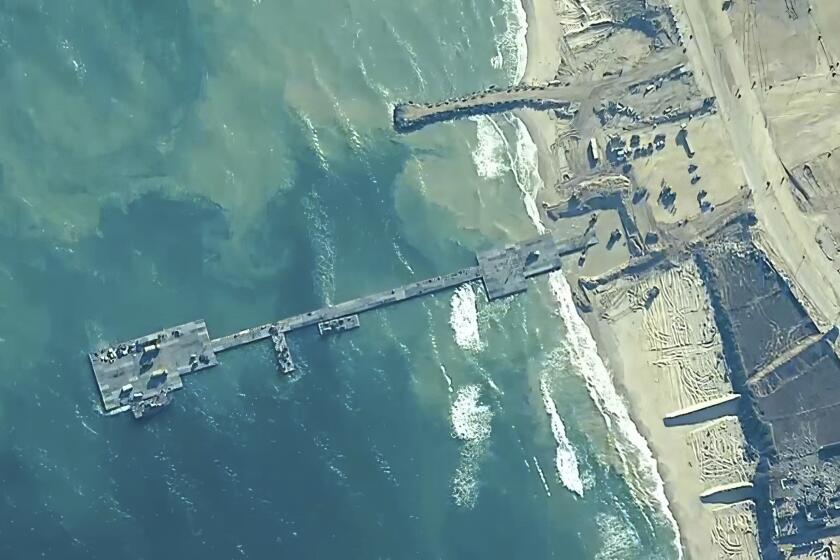Boycott Points to Decrease in Mideast ‘Peace Dividend’
One of the few flickering lights of Arab-Israeli cooperation is in danger of being extinguished this year--the Middle East and North Africa economic summits, launched with great fanfare in 1994 as the symbol of a “new Middle East.”
An announcement last month by Saudi Crown Prince Abdullah that his country intends to boycott this year’s meeting in Qatar is widely seen as a signal to members of the Persian Gulf oil club that they should not attend. Syria also is a strong proponent of a boycott, while Egypt is keeping its options open.
At the summits, sponsored by the United States and Russia, the Middle East countries have sought to find areas of cooperation to increase prosperity for all--the “peace dividend” of Israel’s improved relations with its Arab neighbors.
But the impasse that has struck the Mideast peace process is casting a chill over steps by Arab countries to normalize relations.
Begun in Casablanca, Morocco, and followed by sessions in Amman, Jordan, in 1995, and Cairo in 1996, the summits have been part trade fair and part government forum.
The remarkable sight of Arab princes in flowing caftans and headdresses hobnobbing with Israeli businessmen in yarmulkes raised hopes that half a century of enmity was coming to an end.
Ambitious energy projects, water conservation proposals and tourist marketing plans were discussed at the first meetings. But few of these plans have been put into action. Now Arab commentators argue that another summit would serve no real purpose.
The tiny, wealthy Gulf state of Qatar, encouraged by the United States, so far is insisting that the meeting in its capital, Doha, will go on in November as planned.
*
But Crown Prince Abdullah told reporters on a visit to Lebanon last month that the Saudis will send no one, saying: “We told [the Qataris] this conference will harm them, and we advised them that we and most Arabs will not attend.”
The crown prince, first in line to the Saudi throne, also said that his country will not be swayed by U.S. pleas. “We informed [the Americans] of our viewpoint,” he said. “How can this [summit] happen when Jerusalem is being lost and swallowed?”
Most Arab countries are taking the Saudi view and do not plan to be at the summit, Mohammed Zakariya Ismail, assistant secretary-general of the Arab League, recently told journalists.
Officially, however, the Arab League says it is still too early to decide, and Egyptian Foreign Minister Amir Moussa says that peace process developments between now and November will determine Egypt’s stance.
*
The debate over the summit echoes the controversy that followed last year’s election of Israeli Prime Minister Benjamin Netanyahu. Alarmed by his campaign pledges to oppose a Palestinian state, reinforce Israel’s claim on all of Jerusalem and expand Jewish settlements in the West Bank, a pan-Arab summit in June 1996 issued a statement saying that its members’ improved relations with Israel would depend on further progress being made in peace negotiations.
Last year, some Arab countries urged Egyptian President Hosni Mubarak to call off the economic summit in Cairo. But he demurred, saying that such a move against Israel was premature. He ultimately used the summit to showcase Egypt’s modernizing economy; some Arab delegates shunned Israeli counterparts.
The summits were born of a different time, amid hopes raised by Arab-Israeli negotiations in 1991 and the subsequent peace accords between Israel and the Palestinians.
Advocates argued that a Mideast peace could offer a big boost to the regional economy. If technological, manufacturing and managerial skills in Israel could be combined with capital, resources and markets in the Arab world, the moribund Middle East could be catapulted into the ranks of the world’s growth regions, proponents said.
Sheik Hamad Jassim ibn Jaber al Thani, Qatar’s foreign minister, says the summit still offers business opportunities and Israel’s presence should not be a stumbling block. “The conference does not force anyone to deal or not to deal with Israel,” he has said.
With the region’s most developed and diversified economy, Israel would not necessarily be the biggest loser if the summit does not occur. “This conference is for the benefit of all the countries of the Middle East,” stressed Lior Ben-Dor, an Israeli Embassy spokesman in Egypt. “Not only for Israel.”
More to Read
Start your day right
Sign up for Essential California for news, features and recommendations from the L.A. Times and beyond in your inbox six days a week.
You may occasionally receive promotional content from the Los Angeles Times.






